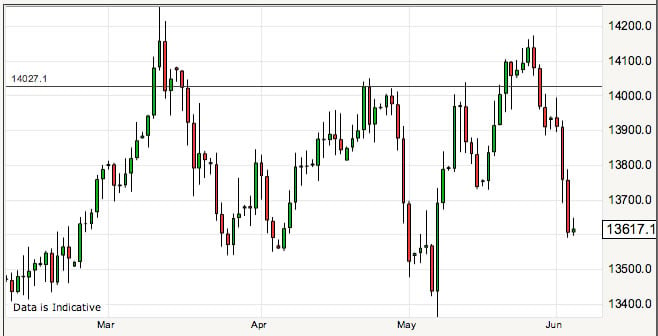GBP-EUR Exchange Rate in a Rut But Long-Term Gains Still Possible
The pound to euro exchange rate (GBPEUR) has collapsed to a one month low as confidence in the euro unexpectedly improves.
Despite what is turning out to be an early June hiccup for the pound sterling we remain confident that those looking to buy euros will ultimately be offered a better exchange rate later in 2015.
The GBP has lost yet further ground against the euro ensuring those looking to buy the shared currency with sterling are doing so at the lowest levels in a month confirming sterling strength cannot be taken for granted. The GBP-EUR exchange rate is trading at 1.3623 at the time of writing as the poor start to June continues.
As we can see it appears the currency pair is caught in a rut:

The strong decline comes on five factors.
The first two factors related to sterling. Technically speaking, as the above shows, the decline in the exchange rate is part driven by the inability of investor momentum to carry GBP higher – we have pointed out on a number of occasions that resistance at 1.40 -1.41 remains a major barrier for traders.
This technical level is significant as so many in the market exit the trade at this point through a lack of confidence and in the absence of any positive domestic data advances beyond this resistance point will be difficult to achieve.
Data. This brings us on to the second GBP-negative factor - over recent days the required data releases needed to see such a move have failed to materialise with the Services PMI release on Wednesday the 3rd proving particularly damaging. The most important portion of the UK economy failed to deliver a strong reading which has only fueled the sterling sell-off.
Keep in mind that any currency rate referenced in this story refer to the wholesale markets, when you make an international payment / transfer your bank will offer you a rate at their discretion.
However, using an independent currency provider will get you closer to the market rate as they apply a smaller spread, in some instances this results in up to 5% more FX being delivered, find out more.
Rececent euro strength has meanwhile been delivered by 3 pro-EUR factors:
- A positive ECB press conference
- Positive inflation data
- Tentative resolution to the Greek crisis
ECB Press Conference: The pound took a fresh plunge against the euro on Wednesday on the back of an optimistic ECB press conference in which ECB President Mario Draghi was quick to point out that the QE program is intended to run through September 2016, but that idea was seemingly overshadowed by the notion that, in the ECB’s eyes, inflation had bottomed, and would continue to run higher in the coming months.
Eurozone bond yields surged on signs that Draghi is happy for them to move higher, this in turn prompted the exchange rate to move higher.
With regards to data, the entire euro exchange rate complex was sent higher 24 hours earlier in the wake of hotter than expected CPI data from the Eurozone which came in at 0.3% vs. 0.2% eyed.
“A resurgence at the oil pump and an industrious German labour market are contributing to solid Eurozone inflation, which is continuing to hold firm ahead of the summer months. ECB president Mario Draghi will continue to receive the plaudits following his successful QE programme. It’s yielding early results as the European bloc continues to take tentative positive steps,” comments Dennis de Jong, managing director at UFX.com.
If the Eurozone continues to catch up with the UK economy in terms of economic performance then the relative performance advantage that GBP has enjoyed over the EUR for the past two years could be whittled away.
Meanwhile a resolution to the Greek situation looms. Deal-confident reports from Brussels began to be equalled by the amount of comments to the contrary, none more so than from Wolfgang Schauble.
"In a style that was just classic Wolfy, the German finance minister claimed that the optimism surrounding a deal isn’t justified given the weakness of Greece’s proposed reforms; Francois Hollande, on the other hand, has given the vague time frame of ‘hours or days’ for a deal to arrive. The mixed messages left the Eurozone indices strong, but not quite as strong as they were during the bull-heavy lunchtime trading," comments Connor Campbell at Spreadex.
Traders is that there is a concerted will being shown to resolve the crisis. A solution to the Greek question remains the single most significant near-term upside threat to the euro exchange rate complex.
But Long-Term Forecasts See Gains for Pound Sterling
Despite what is turning out to be an early June hiccup for the pound sterling we remain confident that those looking to buy euros will ultimately be offered a better exchange rate later in 2015.
We are not alone in this view. Lloyds Banking Group have confirmed that they see GBP/EUR potentially peaking at 1.44.
Danske Bank are also bullish suggesting 1.45 could be achieved while Deutsche Bank have indicated they are now pricing in 1.47. Indeed, most institutional analysts we follow are factoring in higher exchange rates.
The global view remains that the UK economy continues to outperform its Eurozone neighbour on nearly all comparisons. This leaves the UK joining the US as one of only two G10 nations that will look to raise interest rates in late 2015 / early 2016.
The thinking goes that increasing UK yields will see increased inflows of currency into the country as investors look to take advantage of higher yields, in turn pushing up the exchange rate.





